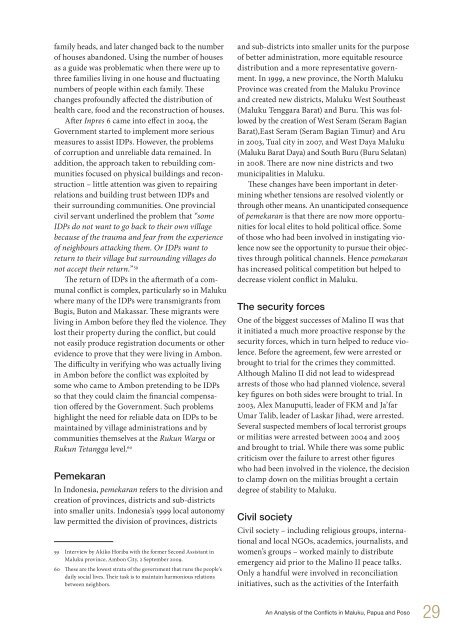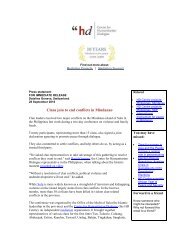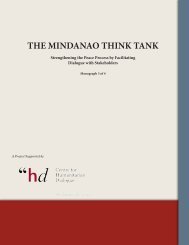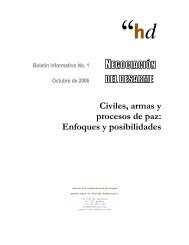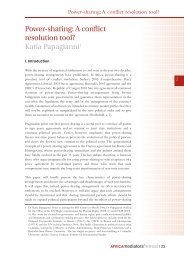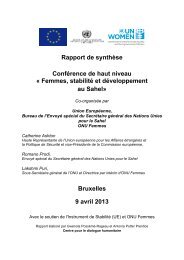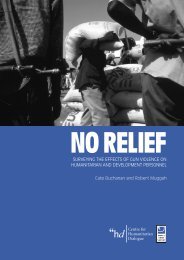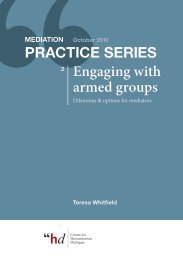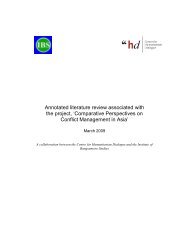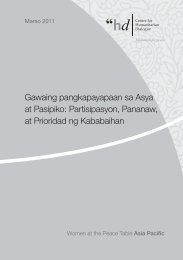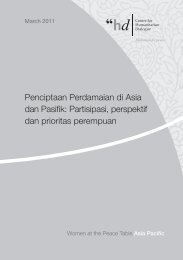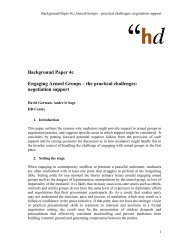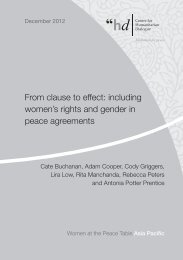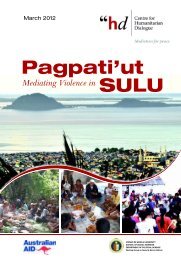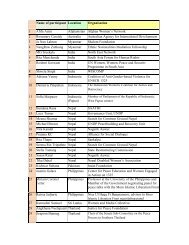Conflict Management in Indonesia â An Analysis of the Conflicts in ...
Conflict Management in Indonesia â An Analysis of the Conflicts in ...
Conflict Management in Indonesia â An Analysis of the Conflicts in ...
You also want an ePaper? Increase the reach of your titles
YUMPU automatically turns print PDFs into web optimized ePapers that Google loves.
family heads, and later changed back to <strong>the</strong> number<br />
<strong>of</strong> houses abandoned. Us<strong>in</strong>g <strong>the</strong> number <strong>of</strong> houses<br />
as a guide was problematic when <strong>the</strong>re were up to<br />
three families liv<strong>in</strong>g <strong>in</strong> one house and fluctuat<strong>in</strong>g<br />
numbers <strong>of</strong> people with<strong>in</strong> each family. These<br />
changes pr<strong>of</strong>oundly affected <strong>the</strong> distribution <strong>of</strong><br />
health care, food and <strong>the</strong> reconstruction <strong>of</strong> houses.<br />
After Inpres 6 came <strong>in</strong>to effect <strong>in</strong> 2004, <strong>the</strong><br />
Government started to implement more serious<br />
measures to assist IDPs. However, <strong>the</strong> problems<br />
<strong>of</strong> corruption and unreliable data rema<strong>in</strong>ed. In<br />
addition, <strong>the</strong> approach taken to rebuild<strong>in</strong>g communities<br />
focused on physical build<strong>in</strong>gs and reconstruction<br />
– little attention was given to repair<strong>in</strong>g<br />
relations and build<strong>in</strong>g trust between IDPs and<br />
<strong>the</strong>ir surround<strong>in</strong>g communities. One prov<strong>in</strong>cial<br />
civil servant underl<strong>in</strong>ed <strong>the</strong> problem that “some<br />
IDPs do not want to go back to <strong>the</strong>ir own village<br />
because <strong>of</strong> <strong>the</strong> trauma and fear from <strong>the</strong> experience<br />
<strong>of</strong> neighbours attack<strong>in</strong>g <strong>the</strong>m. Or IDPs want to<br />
return to <strong>the</strong>ir village but surround<strong>in</strong>g villages do<br />
not accept <strong>the</strong>ir return.” 59<br />
The return <strong>of</strong> IDPs <strong>in</strong> <strong>the</strong> aftermath <strong>of</strong> a communal<br />
conflict is complex, particularly so <strong>in</strong> Maluku<br />
where many <strong>of</strong> <strong>the</strong> IDPs were transmigrants from<br />
Bugis, Buton and Makassar. These migrants were<br />
liv<strong>in</strong>g <strong>in</strong> Ambon before <strong>the</strong>y fled <strong>the</strong> violence. They<br />
lost <strong>the</strong>ir property dur<strong>in</strong>g <strong>the</strong> conflict, but could<br />
not easily produce registration documents or o<strong>the</strong>r<br />
evidence to prove that <strong>the</strong>y were liv<strong>in</strong>g <strong>in</strong> Ambon.<br />
The difficulty <strong>in</strong> verify<strong>in</strong>g who was actually liv<strong>in</strong>g<br />
<strong>in</strong> Ambon before <strong>the</strong> conflict was exploited by<br />
some who came to Ambon pretend<strong>in</strong>g to be IDPs<br />
so that <strong>the</strong>y could claim <strong>the</strong> f<strong>in</strong>ancial compensation<br />
<strong>of</strong>fered by <strong>the</strong> Government. Such problems<br />
highlight <strong>the</strong> need for reliable data on IDPs to be<br />
ma<strong>in</strong>ta<strong>in</strong>ed by village adm<strong>in</strong>istrations and by<br />
communities <strong>the</strong>mselves at <strong>the</strong> Rukun Warga or<br />
Rukun Tetangga level. 60<br />
Pemekaran<br />
In <strong>Indonesia</strong>, pemekaran refers to <strong>the</strong> division and<br />
creation <strong>of</strong> prov<strong>in</strong>ces, districts and sub-districts<br />
<strong>in</strong>to smaller units. <strong>Indonesia</strong>’s 1999 local autonomy<br />
law permitted <strong>the</strong> division <strong>of</strong> prov<strong>in</strong>ces, districts<br />
59 Interview by Akiko Horiba with <strong>the</strong> former Second Assistant <strong>in</strong><br />
Maluku prov<strong>in</strong>ce, Ambon City, 2 September 2009.<br />
60 These are <strong>the</strong> lowest strata <strong>of</strong> <strong>the</strong> government that runs <strong>the</strong> people’s<br />
daily social lives. Their task is to ma<strong>in</strong>ta<strong>in</strong> harmonious relations<br />
between neighbors.<br />
and sub-districts <strong>in</strong>to smaller units for <strong>the</strong> purpose<br />
<strong>of</strong> better adm<strong>in</strong>istration, more equitable resource<br />
distribution and a more representative government.<br />
In 1999, a new prov<strong>in</strong>ce, <strong>the</strong> North Maluku<br />
Prov<strong>in</strong>ce was created from <strong>the</strong> Maluku Prov<strong>in</strong>ce<br />
and created new districts, Maluku West Sou<strong>the</strong>ast<br />
(Maluku Tenggara Barat) and Buru. This was followed<br />
by <strong>the</strong> creation <strong>of</strong> West Seram (Seram Bagian<br />
Barat),East Seram (Seram Bagian Timur) and Aru<br />
<strong>in</strong> 2003, Tual city <strong>in</strong> 2007, and West Daya Maluku<br />
(Maluku Barat Daya) and South Buru (Buru Selatan)<br />
<strong>in</strong> 2008. There are now n<strong>in</strong>e districts and two<br />
municipalities <strong>in</strong> Maluku.<br />
These changes have been important <strong>in</strong> determ<strong>in</strong><strong>in</strong>g<br />
whe<strong>the</strong>r tensions are resolved violently or<br />
through o<strong>the</strong>r means. <strong>An</strong> unanticipated consequence<br />
<strong>of</strong> pemekaran is that <strong>the</strong>re are now more opportunities<br />
for local elites to hold political <strong>of</strong>fice. Some<br />
<strong>of</strong> those who had been <strong>in</strong>volved <strong>in</strong> <strong>in</strong>stigat<strong>in</strong>g violence<br />
now see <strong>the</strong> opportunity to pursue <strong>the</strong>ir objectives<br />
through political channels. Hence pemekaran<br />
has <strong>in</strong>creased political competition but helped to<br />
decrease violent conflict <strong>in</strong> Maluku.<br />
The security forces<br />
One <strong>of</strong> <strong>the</strong> biggest successes <strong>of</strong> Mal<strong>in</strong>o II was that<br />
it <strong>in</strong>itiated a much more proactive response by <strong>the</strong><br />
security forces, which <strong>in</strong> turn helped to reduce violence.<br />
Before <strong>the</strong> agreement, few were arrested or<br />
brought to trial for <strong>the</strong> crimes <strong>the</strong>y committed.<br />
Although Mal<strong>in</strong>o II did not lead to widespread<br />
arrests <strong>of</strong> those who had planned violence, several<br />
key figures on both sides were brought to trial. In<br />
2003, Alex Manuputti, leader <strong>of</strong> FKM and Ja’far<br />
Umar Talib, leader <strong>of</strong> Laskar Jihad, were arrested.<br />
Several suspected members <strong>of</strong> local terrorist groups<br />
or militias were arrested between 2004 and 2005<br />
and brought to trial. While <strong>the</strong>re was some public<br />
criticism over <strong>the</strong> failure to arrest o<strong>the</strong>r figures<br />
who had been <strong>in</strong>volved <strong>in</strong> <strong>the</strong> violence, <strong>the</strong> decision<br />
to clamp down on <strong>the</strong> militias brought a certa<strong>in</strong><br />
degree <strong>of</strong> stability to Maluku.<br />
Civil society<br />
Civil society – <strong>in</strong>clud<strong>in</strong>g religious groups, <strong>in</strong>ternational<br />
and local NGOs, academics, journalists, and<br />
women’s groups – worked ma<strong>in</strong>ly to distribute<br />
emergency aid prior to <strong>the</strong> Mal<strong>in</strong>o II peace talks.<br />
Only a handful were <strong>in</strong>volved <strong>in</strong> reconciliation<br />
<strong>in</strong>itiatives, such as <strong>the</strong> activities <strong>of</strong> <strong>the</strong> Interfaith<br />
<strong>An</strong> <strong>An</strong>alysis <strong>of</strong> <strong>the</strong> <strong>Conflict</strong>s <strong>in</strong> Maluku, Papua and Poso<br />
29


